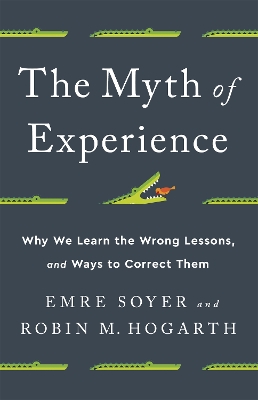
Experience is a great teacher-except when it isn't.
Our personal experience is key to who we are and what we do. We judge others by their experience and are judged by ours. Society venerates experience. From doctors to teachers to managers to presidents, the more experience the better. It's not surprising then, that we often fall back on experience when making decisions, an easy way to make judgements about the future, a constant teacher that provides clear lessons. Yet, this intuitive reliance on experience is misplaced.
In The Myth of Experience, behavioral scientists Emre Soyer and Robin Hogarth take a transformative look at experience and the many ways it deceives and misleads us. From distorting the past to limiting creativity to reducing happiness, experience can cause misperceptions and then reinforce them without our awareness. Instead, the authors argue for a nuanced approach, where a healthy skepticism toward the lessons of experience results in more reliable decisions and sustainable growth.
With real-life examples from bloodletting to personal computers to pandemics, and distilling cutting edge research, Soyer and Hogarth illustrate the flaws of experience as a guide to decision making and provide the remedies needed to improve our judgments and choices-in the workplace and beyond.
Argumentum Ad Verecundiam. This book had an excellent premise, but just a mediocre implementation (in so far as the arguments themselves - the writing was excellent). Soyer and Hogarth excel when showing how one's own experience can blind oneself in numerous areas and arenas, and suggest ways to overcome this blindness. But then fall to their own blindess in accepting and even appealing to the "authority" of "experts" in various topics - seeming to completely disregard that these very "experts" have the exact same problems with being hampered by their own experiences that Soyer and Hogarth are attempting to show us how to overcome in this book. Ultimately, they make a lot of good points, which is why the book gets as many stars as it does. That you have to wade through so much muck to get to all of them is why it *only* gets as many stars as it does. Still, absolutely something everyone should read, and thus recommended.
Reading updates
-
Started reading
-
30 June, 2020:
Finished reading
-
30 June, 2020:
Reviewed
